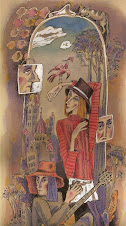When the stock market, home values and car sales tank, innovation soars. "Innovation," says W. Chan Kim of the World Economic Forum, "goes up when the economy goes down." Not just for now, but always.
In 1969 when the economy dropped 1.9 percent, the number of patents granted jumped 14 percent. Previous recessions have spawned Hybrid technology, the Internet, the Blackberry, the iPod, and fresh light on DNA. Recessions bring new materials, new products, new ideals and new ways of working.
"Necessity," says a Latin proverb, "is the mother of invention." As well as inventing and reinventing new ways of marketing and distribution, artists need, more than anything, to be sensitized to their own actions in the general vicinity of the easel--tools, paints, supports, ideas. Filling needs is part of the game, but it also means picking up a permit for creative play. A little stress lights the bulb. Here are a few ideas:
Be surprised by happenstance combinations.
Be prepared to overhaul your attitudes.
Be steady, be thorough, be nimble.
Be fresh, be rested, pace yourself.
Be aware that good stuff also comes when you're tired.
Be open to collaborations and partnerships.
Be an eager student of your own processes.
Become a specialist and demand new quality.
Fall in love with your muse and serve her.
Remember, the best second opinion comes from you.
And by all means spread the "What could be?" religion, and start by converting yourself.
Be on the lookout for subtle nuances or the effects of minor touches. Further, be aware of the passage of time. Time is the stealthy ghost that hides the wisps of change. While epiphanies are worth watching for, slow and steady works as well. In the words of photographer Walter Hawn, "I'm an experimental innovator. I'm a tortoise with no hair."
Things are going to get better. The innovators among us will not only notice it first, they'll lead.
Best regards,
Robert
PS: "He who will not apply new remedies must expect new evils; for time is the greatest innovator." (Sir Francis Bacon)
Esoterica: An essential of innovation is the tendency to err. Cherish your ability to make errors. A skill above all others is the appreciation and adoption of certain errors and the condemnation of others. This talent, whether intuitive or learned, is the key to rugged individualism, human uniqueness, personal style and creative progress. "Sometimes when you innovate, you make mistakes," says Steve Jobs. "It is best to admit them quickly, and get on with improving your other innovations."
I Left MAGA Host SPEECHLESS on CNN
2 weeks ago










No comments:
Post a Comment